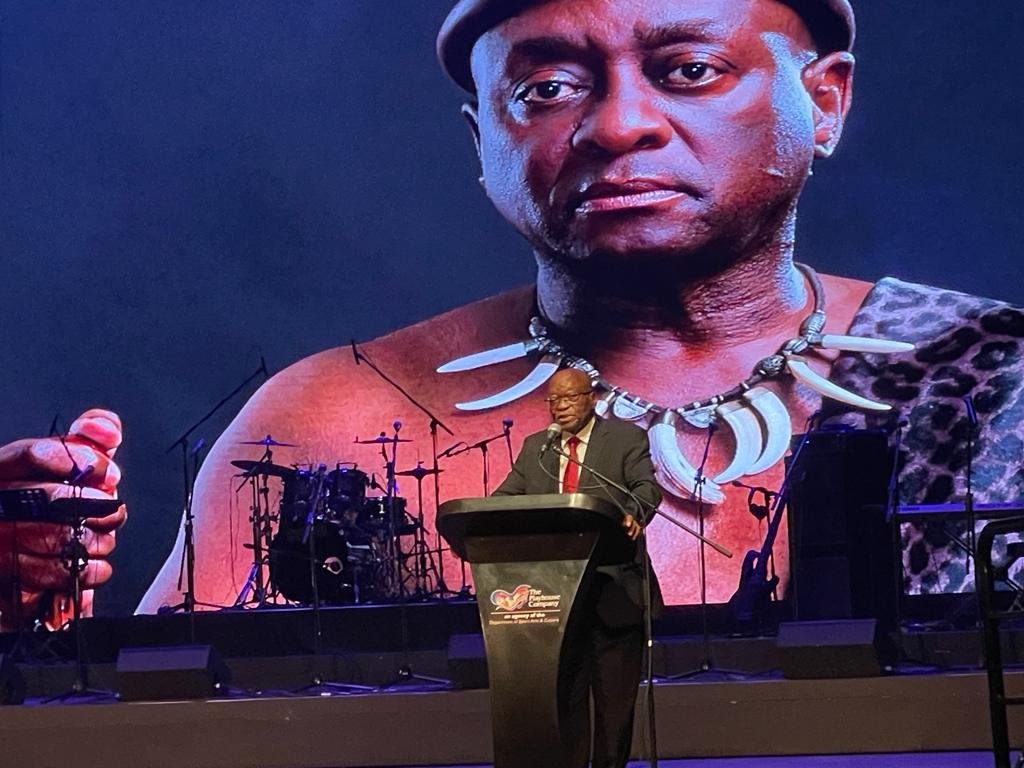Renowned playwright and film maker Mbongeni Ngema was given a hero’s send-off during a State funeral in his home town of Durban, KwaZulu-Natal, in South Africa, on January 5

BY ABBEY MAKOE
Mbogeni Ngema, the film producer who put South Africa and Africa on the artistic international map, will be remembered for his seminal movie, Sarafina, if not for its stage prequel by the same title. Ngema’s music and iconic productions have dominated social media and mainstream news across SA and beyond.
He died suddenly in a car accident on December 27, 2023 and was buried on January 5, 2024.
He was a colourful thespian who was self-made. His rags-to-riches story has inspired many aspiring artistes in a country where opportunities can be hard to come by. He was a choreographer of note as well; a director, guitarist and composer. The multi-talented artiste led the music in his iconic productions, including Sarafina, arguably one of the most famous, and well received, movies to come out of Africa.
Truth be told, by the time Sarafina took the world by storm around 1988 when it performed on Broadway in New York, Ngema was already a household name in SA. However, through Sarafina, which became so successful internationally that it ended up being adapted into a film featuring Whoopi Goldberg, attracted the global focus on the heinous system of racial segregation better known as apartheid.
Other Ngema’s productions include Asinamali and Woza Albert, products of Ngema’s protest theatre that were influenced by the cruelty he endured in his childhood when he endured “forced removal” after his family was uprooted with many others from his birthplace of Verulam in KwaZulu-Natal to make way for an Indians-only settlement under apartheid’s separate development system.

Ngema penned other popular work,s such as State productions Magic @ 4am, which paid tribute to the life and times of the great boxer, Muhammad Ali. On the night of the opening of the show at the Johannesburg State Theatre, Ngema delightfully shocked theatre goers when at the end of the show he called to the stage his friend and hero, Muhammad Ali. Unknown to the audience, Ngema had secretly flown Ali from the US to be part of the opening night.
Ngema also penned another play, The Zulu, which was about the story of his people, the Zulu, and their triumphs against adversity when they fought against white settlers.
He also wrote Lion of the East, a play that was based on the story of Gert Sibande, a warrior who fought the white potato farmers in the Eastern Province of SA known as Mpumalanga (place of the rising sun). The story was a reflection of a dark chapter in the apartheid history of SA when white farmers randomly killed their black labourers and used their corpses as manure in their potato fields. Ngema was determined to tell the story, so that subsequent generations of South Africans could know about their hidden past.
Ngema’s hit song, Stimela Sase Zola, released in the 1980s, remains a signature hit that dominated the airwaves after his recent passing. It also featured prominently during Ngema’s final send-off.
But internationally, Sarafina remains Ngema’s shining light and accolade, having been nominated for a Tony Award in 1988.
Sarafina exposed — and provided context of — the historic June 16, 1976 Soweto uprisings, an epoch moment in the radical push-back against apartheid by high school students who revolted against being taught in the so-called “oppressor’s language”, Afrikaans. The historic uprisings are credited for accelerating the demise of apartheid and the release of Nelson Mandela and other political prisoners from Robben Island.
Although Sarafina was written much later after the uprising, he purposefully and artistically captured the historic events on set, ensuring that audiences were educated about the trauma and cruelty that the youth revolted against.
Some of the key leaders of the Soweto 1976 student uprisings fled to exile in the wake of a witch-hunt by the white minority regime. They ended in several African countries, including Nigeria, where the leader of the revolt, Tsietsi Mashinini and his deputy, Khotso Seahlolo, ended up living. Hundreds of others fled to countries such as Botswana, Eswatini, Mozambique, Zambia, Angola and Tanzania.
This is a history that Ngema skilfully fused together through song and dance in the musical, much to the entertainment — and enlightenment — of audiences across the globe. Although his genius was reflected in virtually every production he set his focus on, Sarafina will remain his most iconic production and it remains unparalleled in SA and indeed the continent.
Ngema’s accolades abroad include being inducted into the theatre Wall of Fame in New York where he was recognised, in his own words, as “one of the greatest writers of the 21st century”.
Harlem — the heart and symbol of black resistance and endurance in the US –reportedly declared May 9 as the Mbongeni Ngema Day.
Ngema also stands honoured in Los Angeles, where his name is written in stars. In SA, he was awarded an Honorary Doctorate that resulted in many addressing him as Dr Ngema.
And when he died, the South African government accorded him a “provincial State funeral category 2”, where a large batch of uniformed police drilled in honour of the man once regarded as a terrorist by the apartheid police. Life happens. Rest well, Munt’mnyama.
Mr Makoe is a South African journalist and travel writer.



